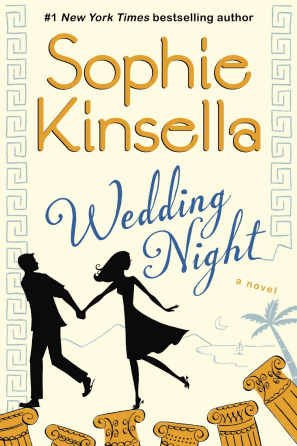By Amy Van Veen (The Cascade) – Email
Print Edition: July 17, 2013
 A botched proposal, a past love reignited, an impulsive trip to Greece and a series of hilarious antics – what’s not to love about chick-lit artiste Sophie Kinsella’s latest novel, Wedding Night?
A botched proposal, a past love reignited, an impulsive trip to Greece and a series of hilarious antics – what’s not to love about chick-lit artiste Sophie Kinsella’s latest novel, Wedding Night?
Well, unfortunately, there are quite a few things not to love.
Sophie Kinsella is the author of such pink-jacketed books as the Shopaholic series, I’ve Got Your Number and Can You Keep a Secret? She also has a number of titles under the penname Madeleine Wickham. It’s hard to believe a name change would bring about a quality change, but in my expert chick-lit opinion, the Kinsella books are far superior to any of the Wickham pieces.
It’s with some sadness, then, that Wedding Night seems to veer off the rails of such Kinsella classics as Undomestic Goddess and into the less hilarious, more uncomfortable waters of Wickham.
It’s got all the ingredients required for getting lost in a written romantic comedy and chuckling away on the beach, but it somehow falls flat. Unlike Kinsella’s other novels that follow the first-person trials of a relatable leading lady, Wedding Night follows the first-person trials of two sisters, sparring back and forth, showcasing the predictable older sister/younger sister, Sense and Sensibility-esque dynamic. There is the hope that this tried-and-tested formula would turn out, but the downside of having one sister’s narrative pointing out all the faults of the other sister is that the reader sees only the annoying flaws of each character. Not once are we given the opportunity to relate to one sister before being pulled into the voice of the other as she’s bitching about the first.
It’s as if a reality show was made about Lottie and Fliss (yes, those are their names), each trying to one-up the other on the spectrum of the ridiculous. Fliss, the eldest, is too sensible for her own good, letting her logic ruin her sister’s vain attempt at momentary happiness by running off with her college love after her stable boyfriend doesn’t propose. Lottie, the youngest, is too driven by her senses to stop and rethink her idiotic plan of marrying her sexy boyfriend from that one summer spent abroad. All her decisions are based on how to defy Fliss. The reader is left flipping pages with the occasional chuckle, all the while keeping their brow furrowed in judgment wondering at what point these foolish women-behaving-like-hormonal-teenagers get their acts together.
As with all Kinsella novels, it has the easy flow to whip through the pages in a matter of beachside afternoons, but unlike other Kinsella novels, it didn’t have me flipping the book open immediately after I’d finished, ready to get lost in the classic chick-lit moments that are too fun not to indulge.
Sadly, the missing Kinsella ingredient of character relatability didn’t have me rooting for Fliss and Lottie. Instead, the Wickham-esque use of multiple characters casting judgment on one another pointed out all the reasons I would not be friends with these women.


